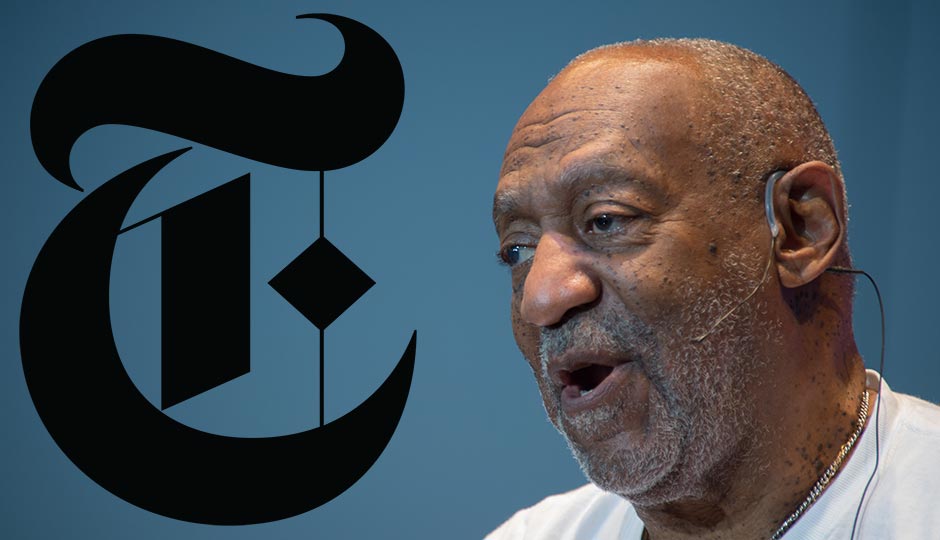New York Times Refuses to Publish Cosby Deposition (We Asked)

Bill Cosby | Randy Miramontez / Shutterstock.com
At the beginning of July, the Associated Press made international headlines when it was the first to obtain freshly unsealed documents in Andrea Constand‘s 2005 suit against accused serial rapist Bill Cosby. The news came out late in the day, conveniently just as courts were about to close, and the AP decided to withhold the documents, instead simply reporting on (some of) what those documents said. So, we quickly located the documents ourselves and uploaded them in their entirety for all of the the world to see.
Then on Tuesday of this week, after the New York Times had caused a similar stir when it managed to get a Philadelphia court reporting agency to release a deposition that Cosby gave at the Rittenhouse Hotel in 2005, and after the Times withheld the actual document from publication, we went on the hunt for the deposition. We called court reporting agency after court reporting agency, even encountering one agency head who demanded a free subscription to Philadelphia magazine in exchange for telling us which agency had it (we didn’t take him up on his offer). Eventually, we got to Kaplan Leaman & Wolfe on our list, and the Old City company confirmed that they were the ones in possession of the deposition. So, we submitted a formal written request.
Much to our surprise, we were told no.
“I am unable to distribute the deposition testimony at this time due to unforeseen circumstances,” KL&F CEO Gregg Wolfe told us on Tuesday night, thereafter saying he wasn’t “at liberty” to elaborate.
Those “unforeseen circumstances” appear to behind-the-scenes legal wrangling that began bubbling up on Monday between Cosby’s Philadelphia attorneys at Cozen O’Connor, Constand attorney Dolores Troiani, the court reporting firm, and U.S. District Judge Eduardo Robreno, the man who ordered the unsealing of documents in the Constand case in early July in the first place.
In court documents filed on Tuesday morning, anger-prone Cosby attorney Patrick O’Connor raged against Constand, the media, and Roberno’s decision to unseal the case. O’Connor included examples of post-decision headlines such as Variety‘s “Bill Cosby Admits to Drugging Women for Sex” and the New York Daily News‘ first-person treatment of “I Drugged Gals for Sex,” essentially arguing that the media have selectively used out-of-context quotes from newly available documents to crucify his client.
The documents we published early in July are there for the public to examine and decide whether Cosby is being treated unfairly. But not the deposition.
So we asked the New York Times, still one of the most important journalistic outfits in the world, to publish the deposition in full. After all, the documents in the case were unsealed not to titillate but because there’s a legitimate public interest here, and because Robreno decided that by positioning himself as a “public moralist,” Cosby has “voluntarily narrowed the zone of privacy that he is entitled to claim,” adding that Cosby has repeatedly stood on his “soap box to volunteer his views on, among other things, childrearing, family life, education, and crime.”
Publishing the deposition in full would take a few keystrokes, a drag and click of a mouse, and a few megabytes of storage on the New York Times‘ servers. It’s the easiest thing in the world to do, assuming that you’re not averse to sharing. But we asked the Times to do just that — share it with the world — and they turned us down.
“We made an editorial decision that excerpts were the most appropriate and meaningful way to tell the story,” a Times spokesperson wrote to us in denying our request. “We have no plans to publish more excerpts at this time.”
Given that this nominally public document could, at any moment, be snatched back under seal with the stroke of a single judge’s pen, we argue that entering it into the public domain now is not only the right thing to do, but, in an era of increased emphasis on transparency and accountability, the journalistically ethical thing to do as well.
Follow @VictorFiorillo on Twitter.


